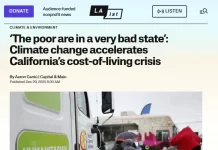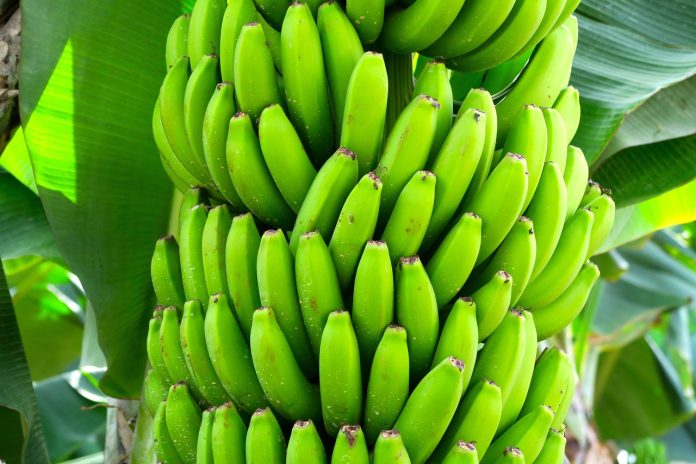The Guardian was among a number of mainstream media outlets to carry a story claiming climate change is threatening wipe out banana production. No data supports this claim, rather it is based on speculation about future climate conditions 55 years in the future. Production and yield trends show that bananas are doing fine, and no reason other than a single study’s speculation to assume they will do otherwise in the future.
The Guardian’s story, “Climate crisis threatens the banana, the world’s most popular fruit, research shows,” paints a picture of current decline and looming disaster for banana production and the people that rely on the fruit as a staple.
“The climate crisis is threatening the future of the world’s most popular fruit, as almost two-thirds of banana-growing areas in Latin America and the Caribbean may no longer be suitable for growing the fruit by 2080, new research has found,” writes The Guardian. “Rising temperatures, extreme weather and climate-related pests are pummeling banana-growing countries such as Guatemala, Costa Rica, and Colombia, reducing yields and devastating rural communities across the region, according to Christian Aid’s new report, Going Bananas: How Climate Change Threatens the World’s Favourite Fruit.”
The report the banana scare story is based upon was not peer reviewed research but rather the output of an activist organization pushing “climate justice.” Despite its questionable pedigree, numerous mainstream media outlets carried stories covering the report, for instance, The Independent, The Telegraph, Euronews, and MSN. The headlines of most of these stories were even more hyperbolic than The Guardian’s, alternatively purporting to report that climate change is “killing,” (Euronews) bananas or that they are on the verge of being “wiped out” (The Independent), or that they may “vanish from export shelves” (The Express Tribune). The reporters writing the stories showed no evidence of exercising any intellectual curiosity questioning the study’s claims or undertaking any independent journalistic investigation to fact check the Christian Aid’s report, rather the stories were written more like press releases promoting the findings.
This lack of a fact check function is especially unfortunate because data show banana production and yields have increased during the recent period of climate change, as have most crops around the world, having benefitted from modest warming and higher carbon dioxide concentrations.
Data from the U.N. Food and Agriculture Organization (FAO) show that between 1993 and 2023 (the last year for which data is available):
- Caribbean banana yields increased by more than 30 percent and production expanded by more than 39 percent;
- Central America’s banana yields grew by more than 36 percent and production rose by nearly 65 percent;
- South American banana yields climbed by almost 29 percent and production increased by more than 47 percent; and
- World banana production grew by nearly 61 percent and production increased by more than 150 percent. (See the graph, below)

The Guardian specifically implies that banana production in Columbia, Costa Rica, and Guatemala are especially threatened with declines or destruction due to climate change, quoting a particular Guatemalan farmer who said, “[c]limate change is killing my crops.” Yet, once again, FAO data debunk such claims. Between 1993 and 2023:
- Columbia’s banana yields fell by slightly more than 30 percent, but its production increased by more than 33 percent;
- Yields of bananas in Costa Rica grew by more than 47 percent and production expanded by more than 38 percent; and
- Guatemala’s banana yields exploded by nearly 144 percent in part driving a more than 796 percent increase in production.
It is unclear why of all the countries and regions examined, Columbia’s banana yields alone declined, but there is no reason why global climate change would harm Columbia’s yields while leaving other banana producing countries straddling the equator unaffected. Columbia’s yield problems are local, not regional or global.
Contrary to Christian Aid’s claims, which the The Guardian and other news outlets uncritically parroted, there is no evidence temperatures or rainfall patterns across the Caribbean, Central, or South America have changed dramatically, or that black leaf fungus it discusses would limit its damage to Columbia’s banana plantations and leave those elsewhere in the region unscathed.
Concerning the future; the theory of global climate change promoted by the U.N. Intergovernmental Panel on Climate Change, suggests that temperatures on or around the equator are not expected to increase much if at all in the future. Rather, the increase in global average temperatures is expected to be driven by substantial changes at the poles, and in far northern and southern latitudes. There is no reason expect a substantial spike in temperatures in countries lying near the equator.
If the popular cavendish strain of banana discussed by The Guardian is unable to adapt to the small increase in temperature that might affect its growing region, it is likely one or more of the hundreds of other banana strains can be grown instead. Alternatively, through cross breeding or genetic engineering, as has been done with other fruits and vegetables, a heartier and more adaptable, less temperature sensitive variety of banana featuring cavendish’s desirable characteristics should be able to be developed over the next 50 years.
As importantly, assertions about what the climate will look like 50 years hence are based on computer models’ projections; yet the models themselves are seriously flawed, as discussed in numerous Climate Realism posts, here and here, for example. Climate models don’t backcast past climate conditions correctly without being forced to by the modelers, and they don’t accurately reflect present temperatures and conditions without substantial adjustments. As a result, climate model projections of future conditions should not be trusted.
Astronomer Carl Sagan popularized the scientific adage that had been around in one form or another since the time of philosopher David Hume, “extraordinary claims require extraordinary evidence.” In the face of modest climate change and large growth in banana production and yields, Christian Aid produced a report claiming, contrary to the evidence, that climate change is harming banana production and threatening the fruit with extinction. That is an extraordinary claim, yet the mainstream media, because it plays into the narrative that they have pushed for nearly two decades that climate change causes everything bad, required no extraordinary evidence before promoting it uncritically as the truth. That says as much about the motives of media outlets like The Guardian when reporting climate matters, nothing good, as it does about the motives of the advocacy organization producing this weak, unsubstantiated report about the future of bananas.

























MAY 17, 2025 There is no climate change crisis; there’s a crisis of corrupted politicians and institutions
Record crops and growing ice sheets are empirical evidence that challenge climate alarmists’ orthodoxy. Ignoring this information is not only unscientific but also immoral. The crisis is not in our atmosphere; it’s in corrupted institutions and politicians, Vijay Jayaraj writes.
https://expose-news.com/2025/05/17/there-is-no-climate-change-crisis/
https://i0.wp.com/expose-news.com/wp-content/uploads/2025/05/FtMay17a.png?resize=1200%2C675&ssl=1